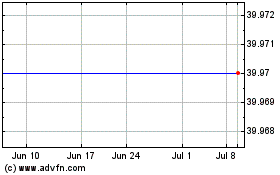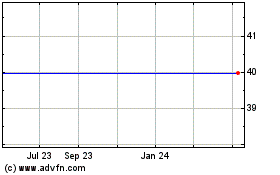TD Ameritrade Institutional Survey Finds Millionaires in the Making are a Promising - Yet Uncrowded - Market for Registered I...
January 20 2015 - 8:30AM
Business Wire
Investor Survey Explores How Up-and-Coming
Millennials View Financial Advisors and How They Plan to Navigate
the Road to Rich
Millennials who are of modest means, but on the right path to
greater wealth, represent a largely untapped opportunity for
registered investment advisors (“RIAs”) looking to add promising
new clients, according to TD Ameritrade’s Millionaires in the
Making survey.
High potential millennials represent an attractive group of
prospective RIA clients, more so than their already-affluent peers,
because they are entering peak earning years and accumulating
assets, yet they are largely overlooked by most financial firms.
The potentially wealthy also are more likely to hire their own
advisor than their wealthy peers, who typically already have an
advisor and aren’t looking to switch.
Millennials, also known as “Generation Y,” are typically defined
as the 80 million Americans born in the 1980s and 1990s. Attracting
this new generation may be critical to the investment advisor
business, where fewer than 10 percent of clients are under 40 and
half are over 60.1 Moreover, millennials are expected to inherit
trillions of dollars2 from the baby boomers who have long sustained
RIAs.
“Advisors can’t wait until this next generation is wealthy
before they start rolling out the red carpet. This transition is
happening now,” said Tom Nally, president, TD Ameritrade
Institutional3. “Our latest research shows RIAs would be
well-served pursuing young investors who may not have great wealth
yet, but who have high earnings potential and are eager to work
with a professional advisor.”
The Millionaires in the Making Survey taps into the mindset of
millennials and how they intend to map out their financial futures.
While millennials are typically painted with a broad brush, TD
Ameritrade took a closer look at how different levels of current
wealth and annual income affect views on financial management and
retirement planning. The survey divided millennials into three
groups:
High Net Worth Millennials have more than $500,000 to
invest and are more likely to hire an advisor. Odds are they’ll
retain their family’s advisor. Wealthy millennials are more
inclined to seek an advisor who is a contemporary, rather than
someone older, so attracting this group may require hiring young
advisors. Nearly half of this group are women, highlighting the
growing need for female-friendly practices.
Potential High Net Worth Millennials have less than
$500,000 to invest but earn more than $150,000 a year. These
investors aren’t rich, but they’re building wealth and have
prospects, like inheritance, that put them on an upward trajectory.
This group is mostly overlooked by financial firms and may be
inclined to hire their own advisor, creating a possible opportunity
for RIAs. More women fell into this category, 62 percent, than
men.
Mass-Affluent Millennials earn less than $150,000 and
have less than $500,000 to invest. This group is worried about
outliving their savings, meeting healthcare costs and having to
work longer. Mass affluent millennials are less likely to hire an
advisor, seeking financial guidance instead from family and
friends.
Below are some key findings from the survey:
Millennial Views on Advisors
- Current wealth impacts whether an
investor keeps or fires their family’s advisor. Among
high-potential millennials with an advisor, 55 percent hired their
own advisor while just 29 percent plan to keep the incumbent family
advisor. By comparison, 63 percent of wealthy millennials with an
advisor said they kept their family’s advisor and had no plans to
change. While previous research showed a higher percentage of
younger investors were willing to leave their family’s advisor,
these latest findings suggest advisors may be doing a better job
engaging their clients’ children. That said, intergenerational
transition is an evolving trend and should be watched closely as
next gen investors continue to build wealth and consider hiring an
advisor.
- Wealthy millennials are more likely
to use an advisor than their high potential peers: 65 percent
versus 33 percent. However, nearly 70 percent of high-potential
millennials want an advisor to help manage their finances.
- Millennials have differing views on
how old their advisor should be. The majority of high-potential
millennials seek out an advisor who is older, while high net worth
millennials showed a stronger preference for advisors their own
age.
- Wealthy millennials want many
communications options. High net worth millennials favor a
range communications channels with their advisors, from email and
phone to in-person meetings and social media. High-potential and
mass affluent millennials prefer email by a wide margin. Whatever
the channel, millennials expect advisors to be accessible and
immediately responsive.
Millennial Money Mindset
- The definition of “financial
success” varies. For wealthy millennials, success means not
depending on a job for income, having enough to indulge in luxury
items and setting aside money for retirement and education. High
potential and mass affluent millennials are more concerned with
having enough stashed away for a “comfortable” retirement.
- Less-wealthy millennials are more
optimistic about reaching their goals than wealthier peers.
Nearly two-thirds of potentially wealthy millennials were
optimistic about their financial prospects, compared with half of
the already-wealthy. Wealthy millennials were more likely to be
pessimistic about achieving their goals than the potentials: 26
percent versus 5 percent.
- Hard work and smart investments are
top factors in achieving financial success. When it comes to
how they can acquire wealth, all millennials rate “making smart
investments” and “hard work” as keys. The mass affluent and
high-potential said being frugal is a top factor, while high net
worth millennials cited family connections and owning a
business.
- Less-wealthy millennials expect to
work longer and need more retirement savings. The potentially
wealthy expect to work longer, with an average retirement target
age of 60.1 years, compared with 56.8 years among already-wealthy
peers. Potentials anticipate needing to save more before they can
retire: $5 million versus $4.5 million among the
already-wealthy.
- Top retirement concerns are
consistent among the millennial groups. Millennials worry about
outliving their savings, needing to work longer and meeting health
care expenses. High net worth millennials were less worried, but
are mindful of the cost of caring for an elderly parent or
relative.
- Inheritance expectations differ
slightly among millennials. Nearly one in five of the
potentially wealthy expect to inherit $100,000 or more. While
nearly two out of five high net worth millennials said they expect
to inherit $100,000 or more.
For a more highlights and a detailed analysis of the
Millionaires in the Making Survey, click here.
About the SurveyResults of the TD Ameritrade Millionaires
in the Making Study are based on a survey conducted by The Pert
Group on behalf of TD Ameritrade, Inc. Five-hundred and thirty-six
investors between the ages of 18 and 39 participated in a telephone
survey from January 15 – February 28, 2014, in which they were
asked to share their views on brands in the financial services
industry. Another 273 investors 40 years and older were surveyed
for comparative purposes. The margin of error in this survey is
±5%. This means that in just over one case out of 20, survey
results based on the 809 total respondents will differ by no more
than 5 percentage points in either direction from what would be
obtained by seeking the opinions of all investors within an age
group. The Pert Group and TD Ameritrade, Inc., are separate,
unaffiliated companies and not responsible for each other's
products and services.
About TD Ameritrade InstitutionalTD Ameritrade
Institutional is a leading provider of comprehensive brokerage and
custody services to more than 4,500 fee-based, independent
registered investment advisors and their clients. Our advanced
technology platform, coupled with personal support from our
dedicated service teams, allows investment advisors to run their
practices more efficiently and effectively while optimizing time
with clients. TD Ameritrade Institutional is a division of TD
Ameritrade, Inc., a brokerage subsidiary of TD Ameritrade Holding
Corporation.
About TD Ameritrade Holding CorporationMillions of
investors and independent registered investment advisors turn to TD
Ameritrade’s (NYSE: AMTD) technology, people and education
resources to help make investing and trading easier. Online or over
the phone. In a branch or with an independent RIA. First-timer or
sophisticated trader. Our clients want to take control, and we help
them decide how - bringing Wall Street to Main Street for more than
39 years. An official sponsor of the 2014 and 2016 U.S. Olympic and
Paralympic Teams, as well as an official sponsor of the National
Football League for the 2014, 2015 and 2016 seasons, TD Ameritrade
has time and again been recognized as a leader in investment
services. Visit TD Ameritrade's newsroom or amtd.com for more
information.
Brokerage services provided by TD Ameritrade, Inc., member FINRA
/SIPC
1 Cerulli Associates, the Cerulli Report, Advisor Metrics 2013,
page 124.2 Advent Software, Three Ways to Reach the Next Generation
of Investors, November 2013.3 TD Ameritrade Institutional is a
division of TD Ameritrade, Inc., a brokerage subsidiary of TD
Ameritrade Holding Corporation.
Source: TD Ameritrade Holding Corporation
TD AmeritradeJoseph Giannone, 201-369-8705Communications
& Public AffairsJoseph.Giannone@tdameritrade.com
TD Ameritrade (NASDAQ:AMTD)
Historical Stock Chart
From Mar 2024 to Apr 2024

TD Ameritrade (NASDAQ:AMTD)
Historical Stock Chart
From Apr 2023 to Apr 2024
